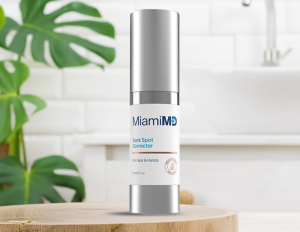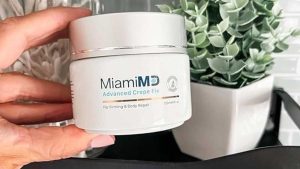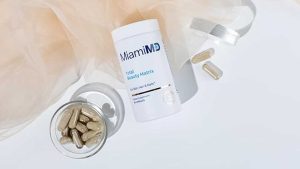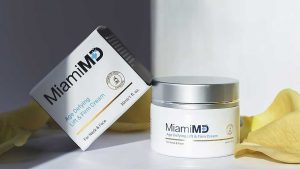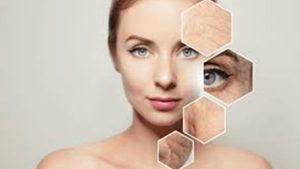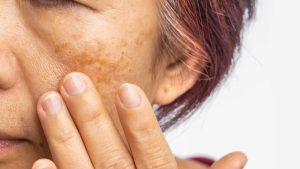Collagen Boosters: Benefits, Risks, & More
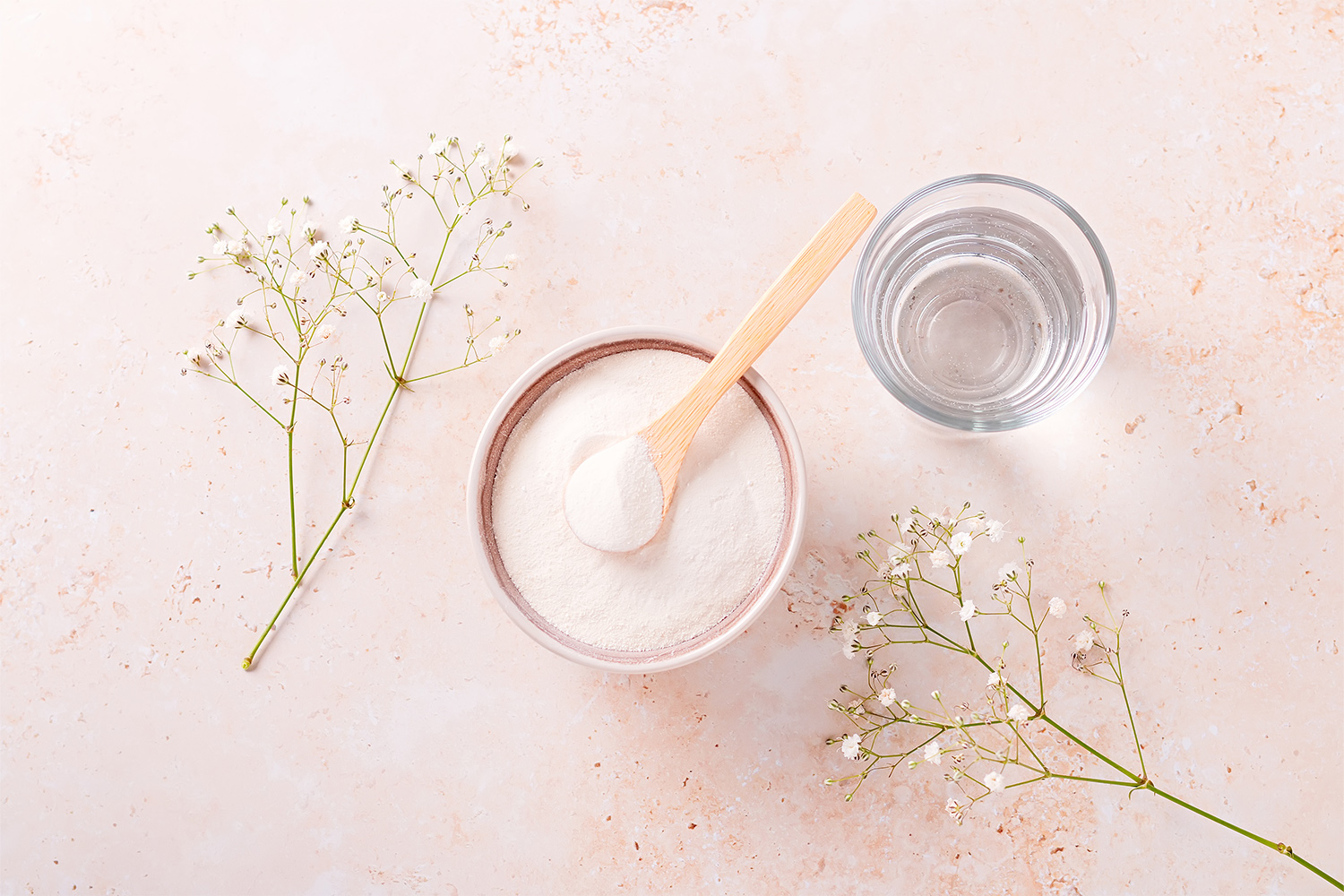
Collagen is one of the single most crucial components in our skin. It is also the component most directly involved with keeping your skin looking firm and radiant. Over time, the natural collagen stores in the body start to deplete, and the body stops being as efficient with replacing them.
That’s where collagen boosters come in. Many products claim to help boost collagen, but Miami MD is here to take a deeper look at the benefits, risks, and more. What options are out there, and do they actually work? Let’s discuss.
What Is Collagen?
To understand the benefits of collagen, you need to understand what collagen is.
First and foremost, collagen is a protein. Not just any protein, though. Collagen is the most abundant protein that makes up the skin. So abundant, in fact, that it comprises between 75% and 80% of the proteins that exist in our skin.
Collagen also helps to build bones, tendons, hair, and muscles (among others). We really can’t overstate the importance of this unique protein. Specifically, collagen is found in the middle layer of the skin, known as the dermis.
The dermis is the thickest of the three layers and is where other essential components of the skin are located — nerves, blood vessels, hair follicles, and sweat, and sebaceous glands. This layer of skin is also filled with connective tissue, and collagen acts like the glue holding it together.
Collagen also teams up with another protein, elastin, to keep the skin plump and firm. When we have enough collagen in our skin, it appears youthful, strong, and healthy. When these levels start to decrease, as they do during the normal aging process, the skin can appear thinner.
Thin skin is much more likely to show fine lines and wrinkles and look visibly “saggy,” as the connective tissue usually holding it tight to the rest of the body can’t do its job as efficiently.
What Are Collagen Boosters?
With the importance of a healthy amount of collagen in the skin, people are constantly searching for ways to help their bodies produce more. Unfortunately, that also means that many products on the market claim to work as collagen boosters.
But is there any truth to the idea that you can actually boost your skin’s collagen production? And if so, how exactly? The main ways people boost their collagen fall into two categories: topical (meaning for use on the skin) and oral (anything you eat or drink).
Topical Collagen Boosters
Topical collagen boosters include skincare products and cosmetic procedures.
Skincare products make up the majority of topical collagen boosters. While that gives you plenty to choose from, it can also make it hard to find products that live up to their claims.
When you’re looking for a skincare product to help you increase your collagen, whether a serum, cleanser, or moisturizer, the first place to start is by deciding if you want to seek out a prescription. Even though prescription collagen boosters, like tretinoin, are incredibly effective, they may not be budget-friendly for everyone.
The good news is, there are plenty of over-the-counter collagen-boosting skincare products that can be just as effective. The most significant difference between them is that over-the-counter products often contain less active ingredients, so it may take longer, more consistent use to see a difference.
Ingredients like Matrixyl 3000, which we included in our Instant Wrinkle Eraser, may even double the skin’s collagen production. There are also cosmetic procedures that are done topically to help stimulate and increase collagen. Among them, microneedling is by far the most popular.
Microneedling works by making tiny, controlled “wounds” to trick the skin into boosting its collagen production. While microneedling tools can be purchased and used at home, this procedure is best done in a safe, controlled environment.
Oral Collagen Boosters
The other option is oral collagen boosters.
If you prefer something more structured, you can purchase collagen in either pill or powder form. You’ll use these products either once or twice a day, and they work from the inside out.
If you’d prefer the more natural route, you can naturally boost your collagen by focusing on foods known for having that effect. Foods rich in vitamin C, for instance, can increase the amount of hyaluronic acid in the body.
Are There Any Risks Associated With Collagen Boosters?
Everything in life has risks, even if those risks are minimal. The risks associated with collagen boosters are directly related to how you are attempting to boost your collagen.
The preferred method of collagen-boosting is by using supportive skincare products, like our Instant Wrinkle Eraser. The risks associated with this type of collagen booster are mostly the rare possibility for an allergic reaction to a new ingredient, leading to skin irritation and discomfort.
Most of that risk can be avoided by simply performing a patch test before applying it on your entire face. The risks associated with other types of collagen boosters may be more significant.
Take oral collagen supplements, for example. Anything you ingest can impact your body on a more systemic level. Collagen supplements are also not FDA approved, which means that the quality and safety can vary significantly between companies. Some may include dangerous toxins or heavy metals, as well.
Collagen boosting procedures, while they can be more quick-acting than topical skincare products, also come with a more extensive set of risks. Microneedling is one of the most popular.
Even though it is mostly safe, there is always a risk of infection due to the process involved. Your skin will also take longer to heal, which means you’ll be stuck with a red, irritated face for at least a few days afterward. For many people, the risks outweigh the rewards.
How Can I Slow Down Collagen Degradation?
Instead of trying to play catch-up, people often wonder if there are ways to slow down collagen degradation in the first place.
While nothing can slow down the natural process of collagen degradation, there are things that you can do not to speed it up. Not wearing sunscreen is the biggest thing that most people do that has the unfortunate side effect of damaging the skin’s collagen.
The ultraviolet radiation from the sun can be dangerous for the skin in many ways. It also leads to free radicals being let loose, damaging collagen as they look for their missing electron.
Wearing appropriate sunscreen that is broad-spectrum, water-resistant, and has an SPF of 30 (or more) can protect your skin from all kinds of concerns.
Focusing on a healthy, whole-food-based diet can also help. So much of the “easy” food we eat just isn’t good for us. When you pay attention to what you’re putting in your body, you can make sure to give your body just what it needs to create as much collagen as possible.
In Summary
Collagen boosters are a great way to make sure your skin stays youthful, radiant, and firm for as long as possible. However, when choosing a method to help increase the collagen production in your skin, make sure you go with one that works with as few side effects as possible.
Miami MD products work to help you find exactly the skin tone and appearance you’re looking for. We use proven ingredients, hand-picked by our dermatologist (Dr. J), that provides functional beauty, so you look just as fabulous wearing them.
Sources:
New research shows anti-wrinkle cream chemical works | University of Reading
